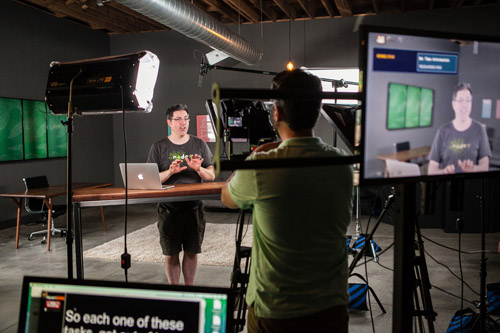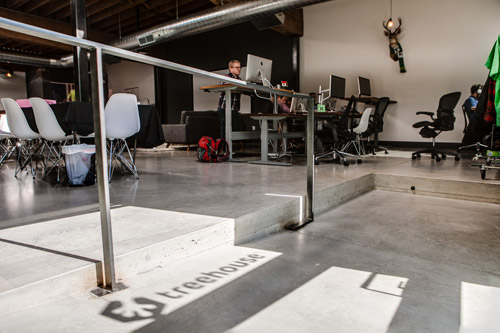Treehouse CEO Ryan Carson builds a 21st-century trade school.

It’s always hard to tell the difference between the cutting edge and the trendy. Either way, Ryan Carson isn’t afraid to leap into the unknown.
The 34-year-old programmer turned tech-startup CEO tracks his every step with a Fitbit, works from a standing desk and recently took up a fad exercise regimen called the “Seven-Minute Workout,” a rapid-fire drill of push-ups, dips, jumping jacks, squats and other exercises meant to keep elite athletes in shape while on the road. “I can do it twice now without puking,” he says.
Carson brings the same sense of experimentation — and relentless drive for self-improvement — to his job as co-founder and CEO of Treehouse, a fast-growing Portland-based company that offers online videos and interactive tutorials designed to help anyone learn to program, regardless of age or experience.
Headquartered in a sparse, open-plan office on the lower, less-trendy part of North Mississippi Avenue, Treehouse features what Carson describes as a “trifecta” of innovative management strategies. Most of the company’s 71 employees telecommute, all staff work a four-day week and email is prohibited internally — company discussions happen on an in-house discussion board that any employee can read.
Another piece of the trifecta: Treehouse has no middle management, having adopted instead a “flat” company structure pioneered by tech companies like Zappos, GitHub and Valve.
Eliminating managers and giving employees a long weekend every week is not the norm in Oregon business circles, even among progressive software companies. But Carson, 6-foot-5 and possessed of a certain messianic zeal, is confident in his vision. “I’m a naive optimist,” he says. “It’s my best and my worst quality.”
That optimism is paying off. Treehouse has attracted 86,000 students since launching in 2011 and has raised $12.6 million in venture funding, including a $7 million series-B round it landed last year. And with a run rate of $10 million, the company is well on the way to being profitable.
In June, Treehouse launched an initiative called Code Oregon, in partnership with Worksystems, a nonprofit funded in part by the U.S. Department of Labor to offer workforce development services in the Portland area. Code Oregon will offer 10,000 students the chance to take Treehouse’s classes for free and provide additional job-placement services. By mid-August, 5,000 students had signed up.
Treehouse tutorials have already been used by Umatilla high schools and several private “learn to code” programs, such as Portland’s Epicodus. But Carson’s ambitions go far beyond meeting sales and marketing targets. He aims to do nothing less than revolutionize higher education by providing everything students need to land a job in the tech industry — without ever setting foot in a classroom.
“We’re trying to remove the need to go to college,” he says.
 It’s an audacious project. In fact, some might say Carson is not so much naive as full of hubris, a trait that has become synonymous with startup tech executives, in Portland and Silicon Valley. And yet all signs suggest higher education is ripe for transformation.
It’s an audacious project. In fact, some might say Carson is not so much naive as full of hubris, a trait that has become synonymous with startup tech executives, in Portland and Silicon Valley. And yet all signs suggest higher education is ripe for transformation.
Nationwide, 53% of recent college graduates were either unemployed or had jobs that didn’t require a college degree, according to an Associated Press analysis of government data published in 2012. That’s partially due to the 38% increase in the number of people under 25 who had at least a bachelor’s degree between 2000 and 2012, The Atlantic reports. But even as the competitive benefit of a degree has declined, tuition has skyrocketed. Tuition at Oregon’s seven public universities more than doubled from $3,507 to $8,305 between 2000 and the 2014, rising far faster than the rate of inflation.
Little wonder tech entrepreneurs are lining up for a shot at building the next Netflix or Airbnb of education. Over the past few years, dozens of companies and organizations have sprung up around this code-literacy movement, including other tutorial sites like the New York-based Codecademy, programming “boot camps” that try to teach software-development fundamentals in a matter of weeks, and advocacy groups like Code.org, a nonprofit backed by the likes of Bill Gates and Mark Zuckerberg, with a mission of improving computer science education in K-12 schools.
In June, Kaplan Inc., one of the nation’s largest for-profit education providers, announced it was buying Dev Bootcamp, a 2-year-old school that offers nine-week crash courses to aspiring software developers.
 Treehouse is riding both the online-education trend and the code-literacy trend. At a cost of about $300 per year, the price is certainly right — and the promise of landing a lucrative job after only six months of training is seductive. Carson aims to replace a high-priced university degree of debatable street value with a practical bargain product accessible to the masses. But the project brings up a few questions: Can students really learn the skills needed to start a career in software development without going to college? Will companies hire workers who don’t have college degrees?
Treehouse is riding both the online-education trend and the code-literacy trend. At a cost of about $300 per year, the price is certainly right — and the promise of landing a lucrative job after only six months of training is seductive. Carson aims to replace a high-priced university degree of debatable street value with a practical bargain product accessible to the masses. But the project brings up a few questions: Can students really learn the skills needed to start a career in software development without going to college? Will companies hire workers who don’t have college degrees?
Carson, the optimist, says yes.
The idea behind Treehouse isn’t rocket science: The company is applying the vocational school model to computer programming, a profession that historically has required at least a bachelor’s degree in computer science. That model suits the changing needs of the high-tech and software marketplace, says Dino Vendetti, founder of the Bend-based startup incubator FoundersPad and the managing director of the Silicon Valley-based venture firm Formative Ventures.
Vendetti has advised dozens of technology companies and has watched as attitudes about educational credentials have evolved over the years. “Today companies care more about what you can do than a degree,” he says. “Do you have the aptitude? The collaborative skills? Can you work in a team?”
 Luke Kanies, CEO of the fast-growing Portland software startup Puppet Labs, echoes that assessment. “We’re happy to hire anyone with any education, as long as they have the skills,” he says. “We have executives with no college degrees, and plenty of others throughout the company who haven’t followed a traditional education path.”
Luke Kanies, CEO of the fast-growing Portland software startup Puppet Labs, echoes that assessment. “We’re happy to hire anyone with any education, as long as they have the skills,” he says. “We have executives with no college degrees, and plenty of others throughout the company who haven’t followed a traditional education path.”
Employers are downplaying the value of a college degree in part because demand for skilled coders far outweighs the supply. Although hiring isn’t as competitive in Oregon as it is in Silicon Valley, there’s still a shortage of software developers, Vendetti says. Rick Turoczy of the Portland Incubator Project agrees. “It’s framed as a ‘talent problem,’” he says. “But it’s actually a ‘talent with applicable knowledge’ problem.”
Carson takes that argument to its logical extreme. College is not only unnecessary, he says, but in many cases it’s actually a hindrance. That’s because instead of jumping into the workforce right away, traditional students spend four years taking a wide range of classes. Carson isn’t opposed to studying the humanities but says college — a “four-year vacation” — is too expensive and time consuming. He also thinks traditional computer science programs are bogged down with a surfeit of theory and mathematics.
Treehouse can get students “job ready” in as little as six months, depending on the time students invest and how long it takes them to absorb the material, Carson claims. And Treehouse doesn’t offer math classes. Why? Because you don’t need to be good at math to be good at programming, Carson says.
“It’s more like writing, more like storytelling … more about knowing what you’re trying to build, where you’re trying to go and the patience to get through all of the mistakes that you’ll make.”
A tech entrepreneur eager to dismantle the old and embrace the new, Carson is a man of his times. But his dismissive attitude toward academia is also rooted in personal experience. Carson graduated from Colorado State University with a degree in computer science in 2000. Although he didn’t have trouble landing a job, he quickly discovered employers were looking for a different set of skills than the ones he learned in class.
 “I never wrote a single line of C++ professionally,” he says, referring to a venerable computer-programming language he learned in college — a language that is still enormously popular but seldom used in web development. So Carson had to learn new languages and skills on his own. “It seems so wasteful.”
“I never wrote a single line of C++ professionally,” he says, referring to a venerable computer-programming language he learned in college — a language that is still enormously popular but seldom used in web development. So Carson had to learn new languages and skills on his own. “It seems so wasteful.”
The academic establishment, not surprisingly, begs to differ. A bachelor’s degree isn’t necessary for entry-level web development jobs, agrees Warren Harrison, chair of the computer science department at Portland State University. On the other hand, argues Harrison, people who learn to code without learning the fundamentals of computer science might not be able to transfer their skills to other technologies as the languages they learn become outdated. “Those folks will hit a ceiling,” Harrison says. “That’s where an actual degree in computer science is going to come in.”
College graduates still earn $650,000 more in their lifetimes than those with only a high school diploma, Pew Research reported in 2012. And of course, some degrees are worth more than others, and computer science degrees are particularly lucrative. Still, these advantages may not compensate for the underlying problem: A university degree may pay off in the long run, but the real challenge facing higher education today is the expense.
 Students who can should seek out a computer science degree, Vendetti says. “It’s the best degree a young person can get.” But the value of the Treehouse model, he says, is that it offers adults a chance to retool themselves, or for young people who can’t afford to go to college the opportunity to learn skills to land a job with a decent wage.
Students who can should seek out a computer science degree, Vendetti says. “It’s the best degree a young person can get.” But the value of the Treehouse model, he says, is that it offers adults a chance to retool themselves, or for young people who can’t afford to go to college the opportunity to learn skills to land a job with a decent wage.
That argument is beginning to resonate with policymakers, even as Oregon pursues its ambitious 40-40-20 education reform goals, aimed at getting more Oregonians to graduate from college.
“If you want to take classes for a philosophical love of learning, that’s great if you can afford it,” says Julie Parrish (R.-West Linn). Parrish, who attended the Treehouse-Code Oregon launch party in June, is bullish on traditional education and has been a proponent of helping more students attend colleges and universities through initiatives such as Pay It Forward, which would have allowed residents to attend Oregon public schools tuition free in exchange for paying a percentage of their future earnings.
But Parrish also thinks Treehouse may be a better way to help people land jobs. “We should be thinking about education from a workforce-development perspective,” she says.
As a kid Carson loved programming. But according to his dad, Chance Carson, who spoke to OB from his home in Colorado Springs, the former high school prom king was always more of a people person than a computer geek. Carson channeled those social skills into a couple of training and education endeavors he launched while living in England in the mid-2000s. In 2006 he started Carsonified, a company offering graphic design and web development workshops and conferences in the London area.
Carsonified was a financial success, but by 2010, its namesake realized the workshops would help only a small number of people. “It was really only helping people who were already wealthy,” Carson says. “They could fly to these things, pay big-ticket prices.”
That led to something of an existential crisis. “I was thinking, ‘I’m getting older, I’ve had a couple of kids,’” says Carson, who met his wife, Gillian, when she wrote an article about a meetup series he started in London. “I needed to do something that really matters, that helps people at scale.” He came up with the idea of hiring a teacher to produce instructional videos the company could sell through its existing web magazine, Think Vitamin.
Carson sold $3,000 in subscriptions in the first day. After a few months, he realized that running the new online education component was what he wanted to do with his life. “This is the company I want on my gravestone,” he said, speaking at the Elevating Impact Summit in Portland last June.
 In 2011 Carson and his wife sold the events side of Carsonified to focus on Think Vitamin and, the following year, renamed the venture Treehouse. It was around then that Digg founder and tech investor Kevin Rose invested in the company. Carson realized he would need capital to help scale the business and decided to relocate to the United States. Treehouse already had a development office in Orlando, Florida, but the Carsons settled on Portland as the company’s new home. Today they live in the Irvington neighborhood with their two preschool-age children.
In 2011 Carson and his wife sold the events side of Carsonified to focus on Think Vitamin and, the following year, renamed the venture Treehouse. It was around then that Digg founder and tech investor Kevin Rose invested in the company. Carson realized he would need capital to help scale the business and decided to relocate to the United States. Treehouse already had a development office in Orlando, Florida, but the Carsons settled on Portland as the company’s new home. Today they live in the Irvington neighborhood with their two preschool-age children.
Carson fancies himself a disruptor. But online education has been around for years, and most universities now offer some courses — or even entire degrees — through the web. Even as new companies like Coursera, edX and Udacity have sprung up around MOOCS (massive open online courses), the Internet-based business and education model has yet to displace old-fashioned classrooms. That’s because nobody has come up with a good substitute for face-to-face interaction, educators and industry experts say.
Most students don’t want to learn on their own, says Michael Kaiser-Nyman, founder of Portland-based brick-and-mortar code boot camp Epicodus, another member of the programming literacy vanguard. “People come to us because they want the experience of working with other people,” Kaiser-Nyman says. “They want experienced mentors and teachers to provide support when something goes wrong.”
Kaiser-Nyman has a vested interest in the personal connection model. But Treehouse and Epicodus, which launched last year, are not competitors. The latter uses Treehouse’s materials as part of its curriculum, and Kaiser-Nyman is working with Treehouse to produce some new courses. “If we could, we’d teach everyone in person,” Carson says. “But it’s not practical for us or our students.”
Recognizing video alone isn’t going to be enough to teach people to program, Treehouse has created an interactive learning experience Carson hopes can mirror classroom education. For example, students can complete all of the programming exercises in their browser — there’s no need to install additional software. The team has also built web-based forums where students can ask each other for help. The company awards “points” to students who answer questions, and these points are displayed on student profiles, so that potential employers can see which students helped their fellow students the most.
It’s too early to say whether these innovations will work. In any case, Treehouse’s business model doesn’t depend on making online learning mainstream. There’s plenty of money to be made selling its videos to schools, boot camps and the autodidacts niche. And as the company continues to grow, the bigger challenge is whether Treehouse can deliver on its ambitious promise: to move people without a bachelor’s degree into well-paying technology jobs.
As of July, only one student had been placed in a paid internship through Treehouse’s job-placement program, which launched in June and is staffed by three full-time employees. Other students found work before the program was launched, Carson says.
Would Treehouse hire its own graduates? Absolutely, says co-founder Alan Johnson, 33. Another example of the Treehouse freewheeling corporate structure, Johnson has no title other than co-founder, and his role in the company is constantly shifting — from programming to marketing to, most recently, curriculum design.
Can an online coding school replace part of the hallowed university system? Are programming schools a fad or a sustainable model that can be replicated in other fields like health care, law and basic science? And how do these models fit into the state’s higher-education reforms, which so far seek to perpetuate the college degree system Carson is trying to knock down?
Most business, civic and postsecondary leaders agree higher education in its current form is unsustainable and that something’s got to give. But until the thousands of students enrolled in Treehouse and other developer boot camps actually get hired, and stay hired, the jury is out on their educational and economic value.
One thing is certain: Carson likes to chip away at hierarchical institutions and implement new, do-it-yourself models that (hopefully) work. He put in place the four-day workweek while at Carsonified back in 2006. That practice, along with eliminating middle managers, has improved recruitment and empowered employees, he says.
Now Carson wants to bring that same sense of self-empowerment to to the people. That means betting on the notion that the public is as driven as he is — that his customers will have the discipline and motivation to stick with Treehouse tutorials long enough to actually improve their lives.
“You don’t need a degree to get a job in tech,” Carson told attendees at the Elevating Impact Summit. “You can learn while you have children; you can learn while you have another job. I’m absolutely religious about this. I’ve never been more passionate about anything in my life.”


